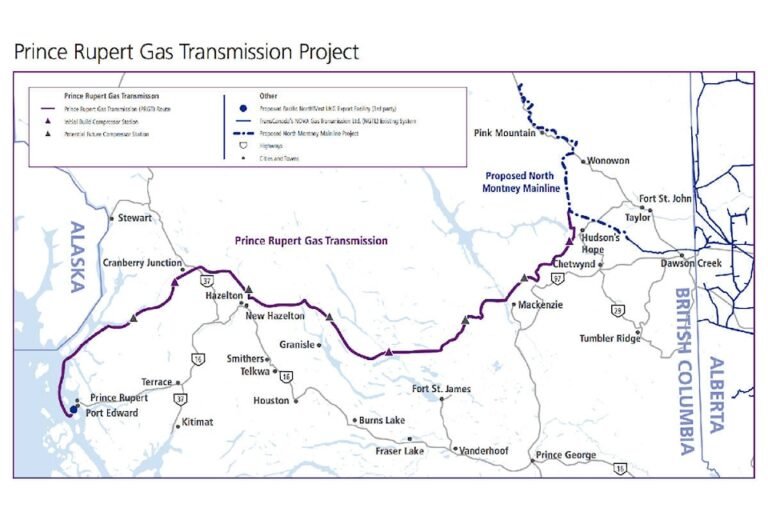TERRACE, B.C. – A legal challenge brought by community and environmental groups against a section of the Prince Rupert Gas Transmission (PRGT) pipeline has been dismissed by a B.C. Supreme Court judge, who ruled that the petitioners did not have the legal standing to bring the case.
The decision, issued on August 20 by Justice Michael Tammen, concerned a petition filed by the Skeena Watershed Conservation Coalition (SWCC), the Kispiox Valley Community Centre Association, and the Kispiox Band. The groups had asked the court to review a decision by the British Columbia Energy Regulator (BCER) that cleared the way for construction on Section 5B of the pipeline. They argued the BCER failed to enforce a permit condition requiring a cumulative effects assessment before construction could begin.
Justice Tammen, however, did not rule on the merits of the groups’ argument. Instead, he dismissed the petition entirely on the basis that the petitioners lacked the legal standing to bring the application for judicial review.
Court Rules Petitioners Not Directly Affected
In his ruling, Justice Tammen applied a three-part test to determine legal standing and found the petitioners did not meet the criteria. He described the petition as a challenge to a “micro-decision” related to one segment of a much larger project that had already undergone a full environmental assessment.
Justice Tammen noted that the petitioners are located in the Kispiox and Skeena Valleys, while Section 5B of the pipeline spans roughly 77 kilometres entirely within Nisga’a Lands. The court found the groups were not directly affected by the decision on this particular section. The ruling stated that “the fact that each is a society committed to one side of an issue is not sufficient to create a genuine interest.”
He concluded that the petitioners appeared to be “busybody” litigants, challenging a decision that did not meaningfully impact them or their direct interests.
Petitioners Call Ruling a ‘Wake-Up Call’
In a statement released through their legal counsel, the petitioners expressed disappointment with the ruling, arguing that it leaves unanswered their core concern about whether the energy regulator upheld its own conditions.
Shannon McPhail, co-executive director of the Skeena Watershed Conservation Coalition, said the court sidestepped a critical public interest question. “This should be a wake-up call for all British Columbians that our energy regulator is not looking after the public interest,” she said.
Ecojustice lawyer Matt Hulse, who represented the groups, echoed the frustration, stating that impacts from a pipeline are not experienced section by section. “Capturing the combined effects is the purpose of a cumulative effects assessment,” he said, arguing that his clients will be impacted by the combined effects of the entire project.
The PRGT project is a proposed 900-kilometre natural gas pipeline that will run from Hudson’s Hope to a new liquefied natural gas facility on Nisga’a Lands near Prince Rupert. In a separate process, the project’s Environmental Assessment Certificate was deemed “substantially started,” ensuring its validity.
The court has ordered the petitioners to pay legal costs to Prince Rupert Gas Transmission Ltd. and the Nisga’a Lisims Government. The petitioners have 30 days to decide whether to appeal the decision.

